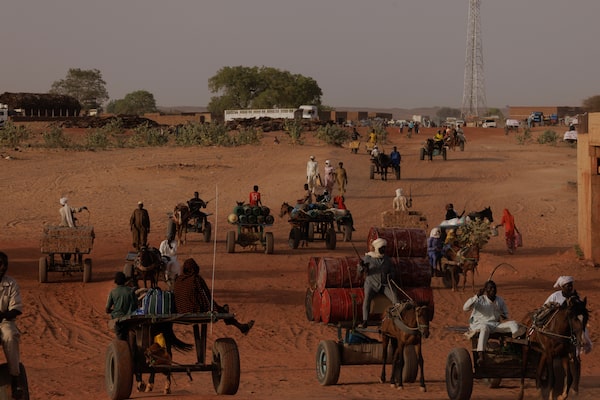
Goods move back and forth on horseback across the border between Sudan and Chad on April 25 in Adre, Chad.Dan Kitwood/Getty Images
A military siege is tightening around one of Darfur’s biggest cities, triggering fears of starvation and another wave of mass killings in a region where human-rights groups are already reporting a genocide.
Diplomats are desperately trying to prevent an assault on El Fasher, the capital of North Darfur region in western Sudan, where an estimated 500,000 displaced people have taken shelter from Sudan’s worsening war.
The paramilitary Rapid Support Forces (RSF), which has been fighting Sudan’s army for more than a year, has advanced closer to El Fasher this month, burning villages around the city, entering some districts and cutting off its supply routes.
With no chance for civilians to escape, the city has become a “kill box,” according to Nathaniel Raymond, head of the Humanitarian Research Lab at the Yale School of Public Health, which is monitoring satellite photos and other data from the region.
Last week, his group warned the United Nations Security Council of the rising risk of atrocities in El Fasher. “The situation is grim,” he told a media briefing on Thursday. “This is a five-alarm fire of the highest severity.”
The camps in El Fasher where displaced people are sheltering are now unprotected, and ethnically targeted killings are inevitable if the RSF enters the camps, Mr. Raymond said.
The RSF’s predecessor, known as the Janjaweed, waged a scorched-earth campaign in Darfur in the early 2000s, torching villages and killing thousands, leading to genocide charges at the International Criminal Court.
After another series of massacres in Darfur in recent months, the Montreal-based Raoul Wallenberg Centre for Human Rights reported last week that there is “clear and convincing evidence” that the RSF and its allied Arab militias are committing genocide in the region, targeting non-Arab Darfuris.
“A mere twenty years after the first genocide of the 21st century unfolded in Darfur, the same perpetrators are committing the same atrocities against the same targeted groups with impunity,” the report said.
In an assault on another city in Darfur last year, the RSF and its allied militia killed an estimated 10,000 to 15,000 people, a UN report said.
El Fasher is the only major city in Darfur that the RSF does not control, but the paramilitary force has repeatedly vowed to capture it. “They are very clear about what they want to do,” Mr. Raymond said. “They are following their plan, and now it appears that they will complete it.”
Taj El Deen, a human-rights activist in El Fasher, said the RSF is blocking the entry of food and fuel to the city, causing a doubling of fuel prices. “This means the citizens of El Fasher will face a lack of drinking water in the next few days, because 95 per cent of the city’s water is dependent on generators that rely on fuel,” he told the media briefing on Thursday.
Dozens of traders who tried to drive into the city this week had their goods looted by the RSF, he said, warning of the risk of deaths from hunger.
“The citizens of El Fasher are living their worst days of the war since it started. There is a lot of suffering. We ask the international community to intervene urgently, to save the lives of the people of Darfur and El Fasher, because we live in a very dangerous situation now.”
Médecins Sans Frontières (Doctors without Borders), a humanitarian group, said on Thursday that it is treating several children for severe acute malnutrition at a field hospital that it opened this week at Zamzam camp, the biggest camp in El Fasher for displaced people.
Diplomats are trying to exert pressure on the RSF. “We are alarmed by indications of an imminent offensive by the Rapid Support Forces and its affiliated militias,” U.S. State Department spokesperson Matthew Miller said in a statement this week.
“An offensive against El Fasher city would subject civilians to extreme danger, including the hundreds of thousands of displaced persons who have taken refuge there,” he said.
Cameron Hudson, an Africa analyst at the U.S.-based Center for Strategic and International Studies, said the looming battle in El Fasher is drawing in militias and tribal fighters from around the region, meaning that the clashes will probably become “the largest and bloodiest battle of the war to date.”
An RSF victory in El Fasher would give it complete control of nearly one-third of Sudan, including several of the country’s international borders, allowing the RSF to control revenue from taxes, customs, gold trading and drug smuggling, Mr. Hudson said in a report on Thursday.
Sexual violence is also likely to increase. The RSF has been implicated in large-scale abductions and gang rapes of girls and women. It allegedly brought abducted women and girls into Darfur in chains in the back of trucks, according to a UN report this week.
 Geoffrey York
Geoffrey York